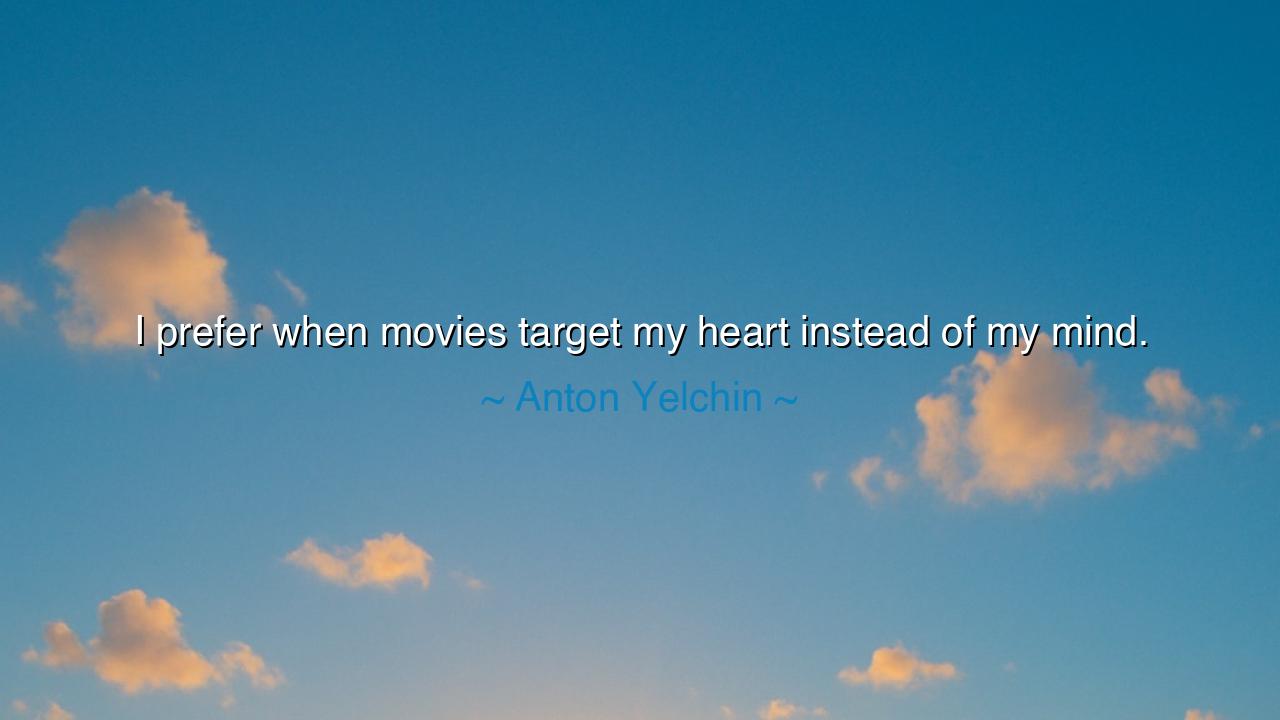
I prefer when movies target my heart instead of my mind.






Listen closely, O Seekers of Truth, to the words of Anton Yelchin, who speaks of the deeper power of storytelling: "I prefer when movies target my heart instead of my mind." In these simple yet profound words, Yelchin speaks to the eternal struggle between intellect and emotion—two forces that shape our understanding of the world. The mind may analyze, critique, and categorize, but it is the heart that truly feels, that resonates with the depth and beauty of life’s most moving moments. In this reflection, Yelchin reveals a longing for films that do not merely engage the rational mind, but that stir the soul, inviting us into a realm where emotion reigns supreme.
In the ancient world, the greatest poets, philosophers, and storytellers understood the power of the heart. Take, for example, Homer, whose epics—the Iliad and the Odyssey—were not simply intellectual exercises. They were deep, emotional narratives that pulled at the very core of human experience. Achilles, with his rage and grief, and Odysseus, with his yearning for home, were not just figures in a story—they were reflections of the human heart in its most raw and vulnerable form. These ancient tales did not seek to appeal to the mind alone but to the heart, where courage, suffering, and redemption are truly felt. Yelchin’s desire for films that target the heart echoes this ancient understanding: that true storytelling moves beyond intellect, speaking directly to the emotions and spirit of the listener.
The distinction between the heart and mind is ancient in its origins. The philosophers of Greece often debated the role of reason and emotion in human life. Plato, in his Republic, spoke of the mind as the ruler of the soul, while Aristotle in his Poetics highlighted the importance of emotion in storytelling. The emotional catharsis that Aristotle spoke of in tragedy—the purging of pity and fear—was not meant to be a mental exercise, but a deep, emotional release that connects the audience to the human condition. This emotional resonance is what Yelchin sought in film—not just stories that engage the mind, but those that touch the heart, that cause us to feel deeply, to experience not just the events of a story, but its emotional truth.
In the same way, Shakespeare’s works do not only appeal to reason; they appeal to the heart and the emotions. The tragedy of Macbeth, the passion of Romeo and Juliet, and the wrath of King Lear are not mere intellectual puzzles—they are emotional journeys that resonate with the heart. The greatest works of literature and art are those that make us feel alive, that stir our deepest emotions and force us to confront the complexity of the human soul. Yelchin’s preference for films that target the heart aligns with this timeless truth: that the most memorable and transformative stories are those that speak directly to our emotions, allowing us to experience life’s full spectrum—joy, sorrow, hope, and despair.
Consider the musical compositions of Beethoven, whose symphonies stirred the heart in ways that words could not express. Beethoven’s music, though deeply structured and complex, was not composed merely to be intellectual; it was designed to move the listener, to take them on an emotional journey. His ninth symphony, for example, does not merely engage the mind but evokes profound feelings of hope, triumph, and unity. The music speaks to the soul in a way that transcends logic, touching the core of what it means to be human. In the same way, films that speak to the heart bypass the intellectual barriers we may place on our emotions and allow us to feel the truth of the human experience, not through thought alone, but through feeling.
The lesson here, O Seekers, is that the greatest works of art—the ones that endure and transform us—are those that speak not only to the mind but to the heart. Yelchin’s words remind us that while the intellect may guide us through life, it is the heart that gives our lives meaning. Films, books, music, and stories that touch the heart resonate deeply, creating a connection that transcends time and reason. These are the works that have the power to change us, to help us grow, and to understand the complexity of the human soul.
And so, O Children, as you walk through life, seek not just to understand but to feel. Seek not just to see the world with your mind but to experience it with your heart. Embrace the stories that speak to your soul, that challenge your emotions, and that stir the deepest parts of who you are. For it is through these stories—these experiences—that we find the truths of our own hearts. Let us remember that true wisdom comes not only from reason but from the depth of the emotions we allow ourselves to experience. Live not just with your mind, but with your heart open, ever ready to be moved by the beauty, the sorrow, and the joy of the world around you.






AAdministratorAdministrator
Welcome, honored guests. Please leave a comment, we will respond soon